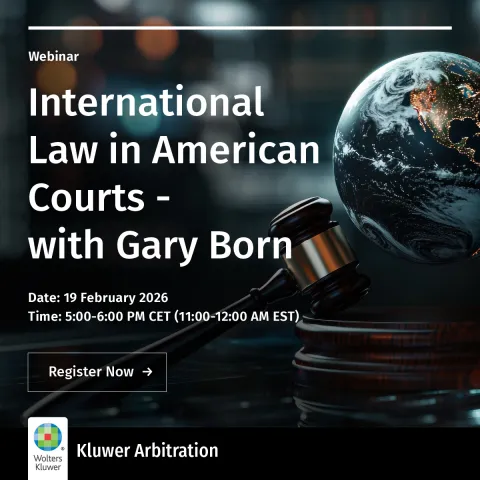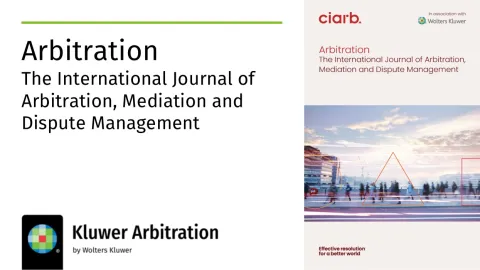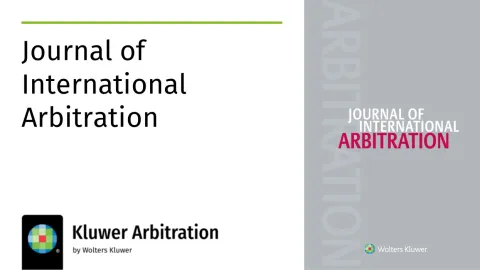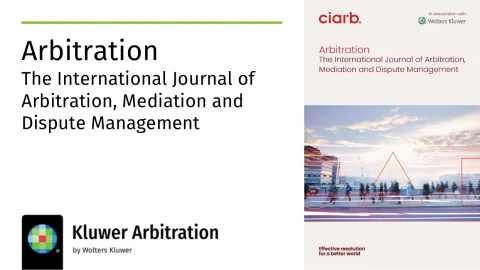Model Bilateral Arbitration Treaty Released for Public Comment
March 13, 2015
We are pleased to announce the publication of a Model Bilateral Arbitration Treaty for comment by interested governmental, commercial and other parties. Comments can be sent to [email protected] or posted for public review by commenting below.
The Model Bilateral Arbitration Treaty (“BAT”) provides a default arbitration mechanism for the resolution of defined international commercial disputes. The mechanism would utilize the UNCITRAL Arbitration Rules, providing an expert, efficient and enforceable means of resolving commercial disputes when nationals from contracting states had not agreed upon an alternative means of dispute resolution. Awards made pursuant to the BAT would be subject to recognition in the contracting states pursuant to the terms of the New York Convention and, subject to additional arrangements, in all New York Convention contracting states.
Gary Born, Chair of the International Arbitration Group at Wilmer Cutler Pickering Hale and Dorr LLP commented: “The proposed Bilateral Arbitration Treaty is a novel and exciting new development in international dispute resolution. I am enthusiastic about the response it has received in capitals around the world, and in the business community. We welcome comments and proposals for amendments or additions to the draft as the concept of a Bilateral Arbitration Treaty moves off the drawing board and into practice.”
The draft Model BAT can be accessed by clicking here. A commentary on the Model BAT’s provisions can be accessed by clicking here. Further details about the Model BAT and its rationale can be found in an article which can be accessed here or in a speech at the University of Pennsylvania Law School by Professor Gary Born, which can be viewed here.











Duarte G. Henriques
Dear Gary, Great piece of work! Here's my comments / suggestions: Article 1 The definition of “Enterprise” should not be limited to legal or juridical entities but rather extend to “individuals” as such. True that the definition encompasses the notion that an enterprise may be owned by private persons but conceptually speaking – at least in the context of most civil law jurisdictions, including those of the Portuguese speaking countries – this notion would entail the “judicial capacity” of an enterprise “de per se” to have a standing to appear in arbitration. However, such understanding will necessary clash with the concepts of legal and judicial personality and capacity: save exceptional cases only legal or natural persons enjoy legal and judicial personality and capacity to litigate / arbitrate. This obstacle will be more apparent when reading the definition of “Enterprise of a Party”. On the other hand, I do not entirely agree that a BAT should exclude “natural persons” – who may have an enterprise of their own without any juridical shell. Article 2 Will the tier process be mandatory? It doesn’t seem so – see Article 5(2) “a contrario” – but an express provision would be justifiable. Article 2(c) and 6 Considering that the negotiation process of the BAT will necessarily be bilateral (at least for the time being) and most likely subject to assessments concerning the legal framework of each contracting State, shouldn’t we dispense with the recognition procedure? I believe that this would be a fundamental pillar of the new BATs. Article 3(2) What about interim measures during the arbitration proceedings? I still have some doubts as to whether or not to exclude them from the jurisdiction of local courts when exceptional / urgent circumstances justify doing so. Article 4 What about providing for a “lex arbitri” in support of arbitration? Article 4(1)(a) What about providing for a set of rules of one specific (or any given) institutional center of one of the parties? Article 7(2)(a) I would suggest adding that the “subject matter is not capable of settlement by arbitration under the law of that Party or does not fall within the definition of “International Commercial Dispute” of this Treaty”. Thanks Duarte G. Henriques
Alan Rau
As one might expect, this is far-ranging and adventurous, and gives us lots to think about. What must be the principal caveat is this (tediously predictable as I know it is): Sophisticated players engaged in transnational contracting can be counted on from the very beginning to be aware of their possibilities, to rationally assess advantages and disadvantages, and to slip into arbitration in the natural and familiar way. In the case of less sophisticated players---in the case of one-shot players---this is more likely to operate as a trap for the unwary, who may be surprised to learn that their alternatives have been foreclosed before a dispute has even arisen. Conversely, sophisticated players are also more likely to have the resources---economic, informational, and cognitive---to enable them to “contract around” the treaty’s default mechanism should they wish, making the treaty’s default rule a dubious or problematic benefit for the “SME.”) Gary himself is characteristically careful enough not to say so, but proponents of similar ideas have not concealed the fact that in their eyes, an altered default rule would have the virtue of causing arbitration to “lose its contractual foundation” altogether---a claim that I have said may “display considerable analytical confusion”; see Rau, Understanding (and Misunderstanding) “Primary Jurisdiction,” 21 Amer. Rev. of Int’l Arb. 47, 161 n. 294 (2011). It does seem a particularly gutsy move here to “expect” that a treaty arbitration will benefit, in the courts of non-contracting states, from the New York Convention, on the basis that a valid agreement to arbitrate is thereby “deemed”to exist. Concededly, though, knowing acquiescence in a state’s default rule is often treated in other contexts as being somehow “consensual.” And there’s certainly nothing wrong with pushing the envelope. But are we really experiencing a paucity of arbitration activity that justifies digging so deep into the barrel? A very minor drafting point: Given the canonical distinction, in the US and elsewhere, between claims that “arise out of a contract” and other, say tort, claims, that don’t so “arise”---but that are “related” to the contract---a distinction that has become second nature to many---I wonder whether the definition of “international commercial disputes” in art. 1 can really be squared with par. 14 of theCommentary: The definition in art. 1 indeed expands the notion of “contracts, transactions, or activities,” but does not expand the operative verb.
Jernej Sekolec
Professor Rau says that BAT would be "a trap for the unwary, who may be surprised to learn that their alternatives have been foreclosed before a dispute has even arisen". Let's think what are the alternatives of the unwary: they are few or often none. Without BAT, the unwary are often stuck with a court, whose language they may not speak, whom they may not trust and which will take forever to decide the case. On balance, once the dispute arises, I think the unwary will find BAT more helpful than not. Those who want to evade their obligations by dragging out the court proceedings may well not like BAT, but my question is: Should we worry about them? I congratulate Gary for his initiative.
Jack Graves
I fully agree with the earlier comments expressed by Dr. Sekolec, as more fully expressed in my 2012 article, Court Litigation over Arbitration Agreements: Is it Time for a New Default Rule? 23 Am. Rev. of Int’l Arb. 113. In that article, I proposed a “default” regime very similar to that suggested by Gary (providing for UNCITRAL Arbitration Rules by default and a resulting role for the PCA in a manner analogous to the application of the Panama Convention to a “bare bones” agreement to arbitrate, at 133-35), but suggested that such a default rule would be particularly beneficial to SMEs (at 131). The obvious disadvantages of litigation of an international commercial dispute would arguably have even greater negative impacts on an SME than on a large MNE, such that a fully informed and objectively rational SME would arguably be even more likely to choose arbitration if it made an express contractual choice. This idea of arbitration as a default rule has been “percolating” for a while now (see Jack Graves, ICA and the Writing Requirement: Following Modern Trends towards Liberalization or Are We Stuck in 1958? 3 BELGRADE L. REV. 36 (Int‟l ed. 2009); and Gilles Cuniberti, Beyond Contract – the Case for Default Arbitration in International Commercial Disputes, 32 FORDHAM INT’L L. J. 417 (2009); and, more recently, Margaret Moses, Arbitration by Default Rather than by Consent, 7 NYSBA N.Y. Disp. Res. Law. 30 (2014); and Margaret Moses, Challenges for the Future: The Diminishing Role of Consent in Arbitration, 11 Transnat’l Dispute Mgmt Issue 4 (2014). In fact, I first heard this “adventurous” proposition in a talk delivered by Dr. Eugen Salpius, a former President of the Chartered Institute of Arbitrators, when I invited him to speak at Stetson University School of Law in early 2005. It is great to see Gary add his considerable reputational weight to this discussion, as well as his thoughtful templates for BATS or MATS to be used in implementing such a default rule. Perhaps this will provide the necessary push to give the idea some serious traction.